Recommendations from a Marxist Perspective
by Parson Young
語言:
English
Photo Credit: PTS News Network
THE SPIRIT OF SUNFLOWER is at the gates of the Legislative Yuan again. This time, it aims to rescue Taiwan’s hard-earned democracy by challenging the bipartisan gridlock that has stymied the nation for far too long. Key figures of 2014’s massive student movement, Dr. Fan Yun of National Taiwan University and Freddy Lim of the internationally renowned black metal band Chthonic, have both formed new political parties and declared their MP candidacy for next year’s federal parliamentary election. They are vested with high hopes to re-electrify our homegrown democracy that is deeply ill with bipartisan shenanigans we’ve gotten tired of a long time ago.
Unlike the US, however, Taiwan is no stranger to powerful third parties. Both James Soong’s People First Party (PFP) and the Taiwan Solidarity Union, “spiritually led” by ex-President Lee Teng-Hui, have greatly influenced the Taiwanese political landscape in the past decade. The only problem was that from the start, these parties are mere breakaway factions of the KMT and the DPP in service of their leaders’ own political interests. They distinguished themselves neither in demand nor ideology, and frequently collaborated with the two primary parties as the Pan-Blue or Pan-Green Coalition in major elections, leaving Taiwanese voters woefully out of options.
 Lee Teng-Hui at a Taiwan Solidarity Union press conference in 2008. Photo credit: CNA
Lee Teng-Hui at a Taiwan Solidarity Union press conference in 2008. Photo credit: CNA
The recent election of Taipei Mayor Ko Wen-Je, who ran as an independent, is also poor in Leftist politics despite being supported by students and liberal voters. Before and after taking office, Ko often blurts out chauvinistic comments against the socially disadvantaged, exposing the bourgeois populist he truly is. Parties such as the Green Party or the confusingly named Non-Partisan Solidarity Union (which is a registered party) are trapped in the fringe. Overall, the Chinese-Imperialist KMT and the bourgeois “liberal” DPP stand firmly as the only two players in Taiwanese politics. The Left has no real standing in public office or in the Legislative Yuan.
Under these circumstances, how can Dr. Fan’s Social Democratic Party (SDP) and Lim’s New Power Party emerge as true Leftist alternatives for the Taiwanese people? Should they be elected, how can they avoid being bullied into the margin by the two parties of the ruling class? Which direction should they pursue to grow into a true force of change for Taiwan?
Have Clear, Positive Demands: Being Outsiders is Not Enough
A DEBILITATING TRAIT symptomatic to most political movements in Taiwan and more generally political movements around the world in the past few years, from Sunflower to Occupy, is an odd reverence of anti-establishment sentiments. The Sunflower had a material target, the Cross Straits Service Trade Agreement (CSSTA) with China to fight against, whereas Occupy took pride in having no demands. Criticism can only serve as a focal point of short-lived movements, but cannot be the foundation of a political party aiming to last.
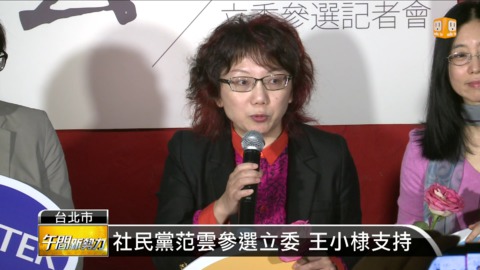 Fan Yun of the Social Democratic Party during a recent press conference. Photo credit: United Daily News
Fan Yun of the Social Democratic Party during a recent press conference. Photo credit: United Daily News
To be fair, Dr. Fan has discussed the SDP’s political goals, but unfortunately relied on idealist tropes such as “protecting the socially disadvantaged,” “democratizing the society and economy,” “incorporating the youth and like-minded people,” and “changing the political landscape of Taiwan.” Voters of bourgeois democracies all over the world know too well that these electoral vocabularies can be used by liberals and conservatives alike, and fundamentally lack any substance. Dr. Fan herself is a vocal feminist activist, and can probably provide concrete legislation to improve gender inequality in Taiwan. However, political parties focusing on single issues never last. If SDP or New Power wants to become serious political forces, they have to recognize that most of the social ills of Taiwan, as in any bourgeois capitalist society, originate from an economic order that is biased and flawed. Any environmental or equality legislation necessarily entails a change in the economic system, and demands such as “raising the minimum wage” or “fund X amount of money to the labor/health insurance system” are infinitely more solid than calls for a “rainbow democracy.”
Nevertheless, in order to clearly justify these practical demands, a serious Leftist party needs to base demands on strong economic theories.
Basing Demands on Strong Economic Theories
THE DICHOTOMY of “working on politics or working on the economy?” (“拼政治還是拼經濟?”) is a cancerous growth in the Taiwanese political vocabulary. It has been used by the KMT against the liberal elements of the DPP, accusing them of a zealous focus on political changes and ignoring the pressing need to put food on the table. The KMT under President Ma has claimed significant growth in GDP under his administration due to his liberalization policy towards China, but we’ve also seen hikes in real estate prices, worsening healthcare/labor services, and historically high income inequality. Youth unemployment rate is also at an unprecedented 12.66%.
While the KMT is losing ground in their claims of expertise in economic policies, liberals in Taiwan still woefully find it difficult to debate on the economic front. Like most liberals around the world, the Taiwanese liberals still hold utopian visions of a version of capitalism that can work for everyone, via tax reforms. They are usually stumped when critics point out such kind of policy will scare away investments and stymie economic growth- precisely the argument the pro-China camp firmly stands on. Is the solution that we should just accept austerity and neoliberal trade agreements as the one true way and growing inequality as a simple fact of life?
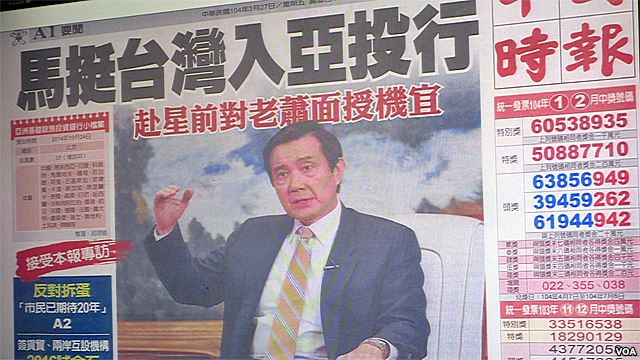 Recent China Post headline concerning the Ma administration intent for Taiwan to apply to China’s Asian Infrastructure Investment Bank. Photo credit: VOA Cantonese
Recent China Post headline concerning the Ma administration intent for Taiwan to apply to China’s Asian Infrastructure Investment Bank. Photo credit: VOA Cantonese
In actuality, modern economics itself is founded on baseless speculations and academic dishonesty. Economists of our time function more like religious prophets than actual scientists, always bringing us visions of the future but without ever being required to take responsibility for their theories. The documentary Inside Job accounts for numerous instances of economists accepting generous donations from private interests to publish works in favor of their beneficiaries’ businesses, including big names such as Glenn Hubbard and Fredric Mishkin. Reinhart and Rogoff of Harvard University’s “This Time it’s Different,” a piece of research celebrated by the IMF and other financial institutions for its conclusion in favor of austerity, is shown to have been based on data incongruent to its claim.
The only solution is to search for a superior economic analysis, one that accounts for all the ills we’re witnessing and how it relates to our mode of production. Karl Marx’s Das Kapital is such a kind of economic analysis. It explains that capitalism is a structural exploitation of labor of the working class by the ruling class, and every aspect of our society’s superstructure is designed to maintain this relationship. Only with this perspective can meaningful policies be devised. Unlike modern economic theories, which base itself on assumptions of rationality and exchange value, Marxist economics understands the political-economic system from how value is created by labor. Marx delineates the process in which the exploitation of workers, necessarily the majority of society, is a foundational process in any capitalist societies. This economic analysis is firmly grounded on the side of the oppressed majority, which is a rock-solid reservoir of support base for the Leftist party. It is encouraging that Dr. Fan herself has expressed favorable views towards Marxist economics. However, if Dr. Fan’s SDP wishes to stand firmly as a party, it necessarily needs to rescue economics from the monopoly of the bourgeois economists, and adopt an analysis that includes a holistic picture of our economy. With this in mind, a meaningful Leftist party needs to orient to the working class.
Orienting to the Working Class
THE EXPLOITED LAYER of society, who creates far more profit for their employers than the wage they are given, is the working class. In Taiwanese political tropes, however, the working class is usually categorized as the “socially disadvantaged,” along with people with disabilities, aborigines, LGBT groups and so on. While the latter three are social minorities (and certainly deserve respect and advocacy), the Taiwanese working class is clearly the majority. According to the Taiwanese government’s own database, just skilled laborers already account for 31.27% of all of the labor force. Adding the workers in service industry (19.46%) and agriculture (4.44%), Taiwan already has a whopping 55.17% of the labor force working in the private sector alone. How can a class of people who are clearly not in the minority be “socially disadvantaged,” unless they are systematically disenfranchised? This layer of the population should be what a true Leftist party aims to serve.
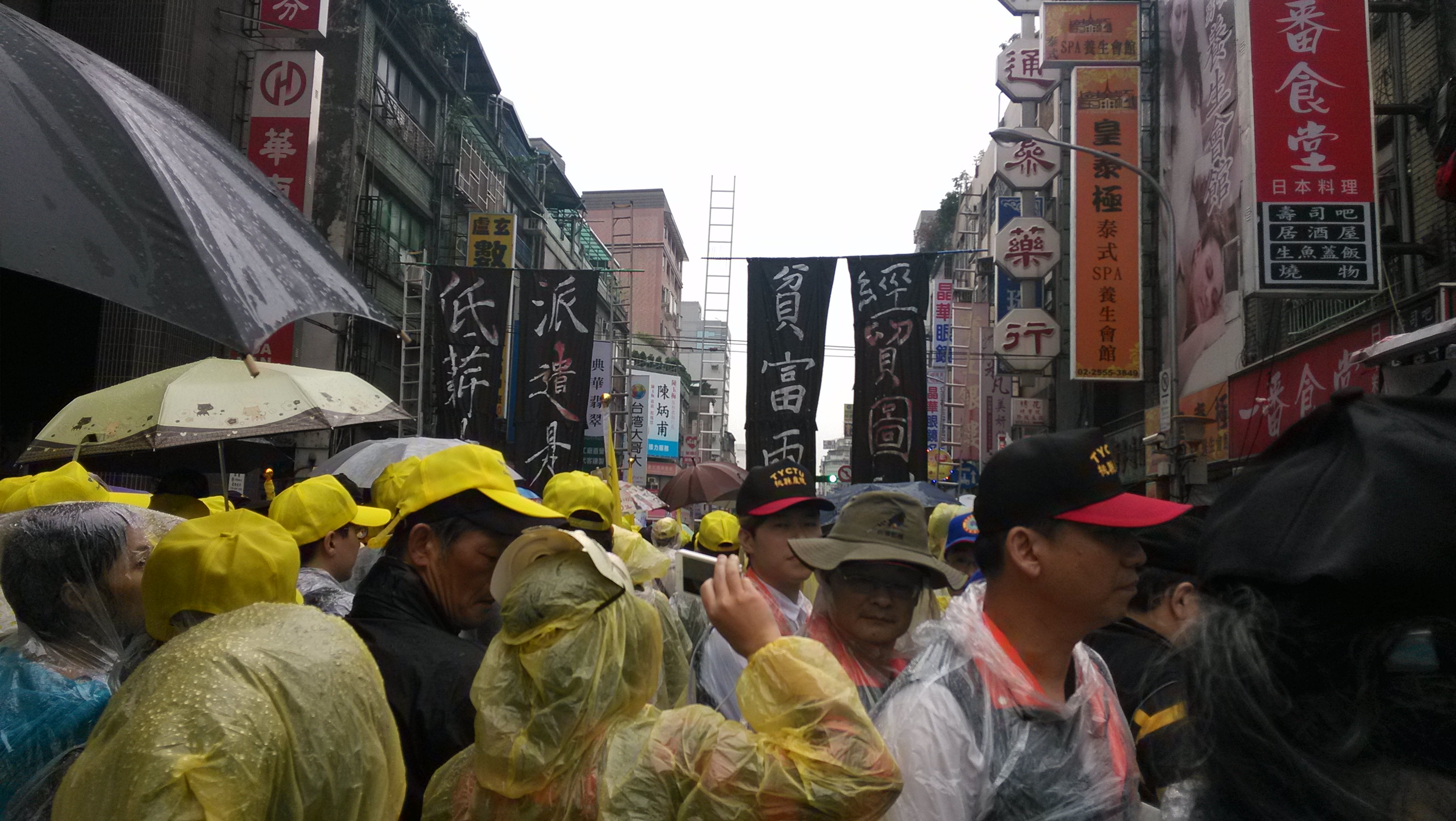 Labor unions demonstrating during May Day, 2014. Photo credit: Brian Hioe
Labor unions demonstrating during May Day, 2014. Photo credit: Brian Hioe
If a political party has strong theoretical basis and practical demands, then it should have no problem explaining to the working class the reasons for their worsening conditions. The nationwide support to the students during Sunflower already proves that a significant sector of the Taiwanese people understand that a policy as far reaching as the CSSTA should not be passed so hastily. As the KMT continues to spare no effort in cooperating with Chinese imperialists, and the DPP bourgeoisie doing little to counter them, the condition can only become worse for the Taiwanese working class. If a Leftist party genuinely analyzes for and serves the working class, then it should have no problem gaining significant popular support. This is why a Leftist political party should stand their ground and never compromise.
Never Compromising
IN PARLIAMENTARY POLITICS, failure to pass legislation is usually interpreted as a failure of the party. This is not necessarily true. If a transparent, principled Leftist party’s legislation is blocked, it only demonstrates the bourgeois politicians’ obstruction and disdain for the will of the working class. In these moments, the Leftist party should not negotiate with their opponents to pass the bill, but to unequivocally communicate to their constituency that their interests are being neglected. This will only strengthen the voters’ recognition that the system needs fundamental change, and garner even more support in the next election. Ultimately, however, the Leftist party should never lose sight on creating a new socialist system that creates a state that fundamentally serves the working class, instead of remaining within the existing system and hopelessly attempt to reform it.
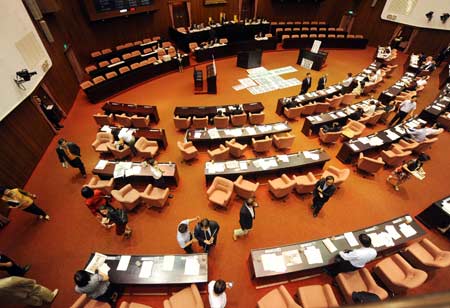 The Taiwanese Legislative Yuan after the end of a session. Photo credit: CNA
The Taiwanese Legislative Yuan after the end of a session. Photo credit: CNA
Obviously, Taiwan’s uniquely peculiar international standing puts us at the whims of US and Chinese imperialist powers. This is why a Leftist party should also have a clearly articulated international outlook.
International Outlook
THE INTERNATIONAL COMMUNITY’S willful disregard of our sovereignty is an arrangement brokered by the international ruling class. We should have no illusions in finding any solutions in isolationism or faith in the US’s unconditional support. At the same time, Taiwan’s obfuscating status renders the country into obscurity from the international public’s attention. The Leftist party’s task, then, is to reach out to similar working class advocates worldwide, to push the struggle of the Taiwanese people into the consciousness of the global working class. Greece’s Syriza and Spain’s Podemos have inspired and electrified Leftist movements around the world, there is no reason why Taiwan cannot stand in solidarity with them as a nation also oppressed by capitalism.
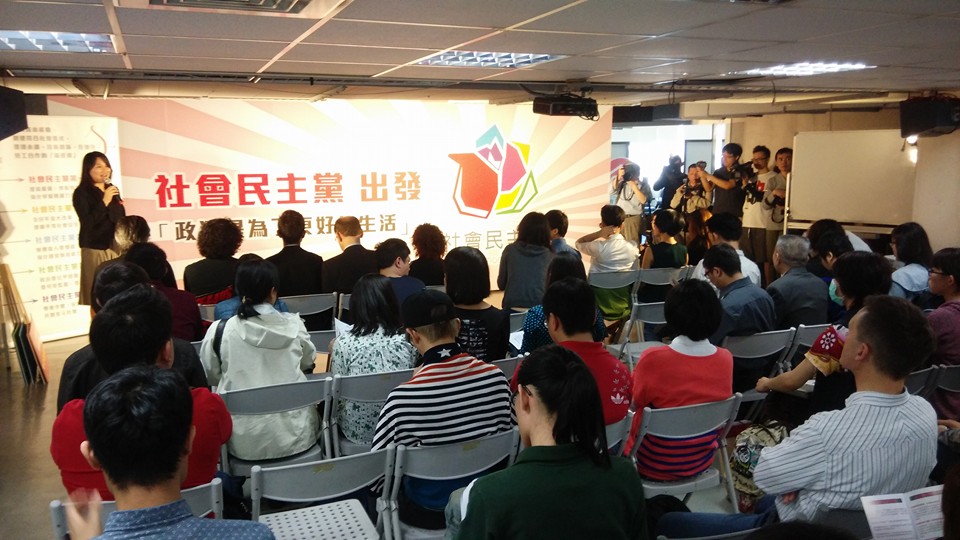 Public event held by the Social Democratic Party on March 29th. Photo credit: 社會民主黨
Public event held by the Social Democratic Party on March 29th. Photo credit: 社會民主黨
With regards to China, the Leftist party should clearly realize that the enemy is the Chinese government, and be forever mindful of the brutal oppression that the Chinese working class faces everyday by their own government. Taiwan’s nationhood will only be respected if it lends a friendly hand to the struggle inside China, in order to show the Chinese people the pettiness of their government’s obsession with nationalism.
These are obviously no simple tasks, but the situation is not impossible. In a political climate rife with bad or no analyses, Taiwan’s only hope for a meaningful Leftist party is one with sound, working class oriented economic theory. The working class of Taiwan will be watching Dr. Fan and Freddy Lim closely. If these two politicians really stand for change and they are willing to defend the interests of the oppressed, we would see this reflected in their program and orientation. There is no middle ground. You are either on the side of the workers or the side of the ruling class. Sooner or later, the working class will see the task of building its own party in Taiwan.







